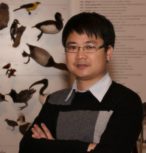DNA reveals the past and future of coral reefs
New DNA techniques are being used to understand how coral reacted to the end of the last ice age in order to better predict how they will cope with current changes to the climate. James Cook Univer

From 2005 to 2022, the main node of the ARC Centre of Excellence for Coral Reef Studies was headquartered at James Cook University in Townsville, Queensland (Australia)








Abstract:
Characterization of genomic biodiversity through comprehensive species sampling has the potential to change our understanding of evolution. To study evolution across a major vertebrate class, dissect the genomics of complex traits, and resolve a centuries-old debate on the avian species tree, we formed large-scale comparative genomic research for birds covering a wide range of avian evolutionary diversity. We propose to use full genome data as golden standard for building the tree of life and demonstrate a well resolved avian family tree with phylogenomic approach. The new avian phylogenic tree has dramatically changed our view of the evolutionary process of many avian life-history traits. Whole genome comparison for all bird species with other vertebrate species revealed several distinct macroevolution patterns of avian genome. The small genome size of bird was a consequence of massive loss of repeat elements and thousands of functional genes in bird ancestral stage. Different with other animal lineages that develop evolutionary innovation by obtaining new genetic materials, the bird genomes have extremely low new gene born rate. Instead, the bird genomes obtain millions of elements that specifically only conserved in bird lineages. These avian specific highly conserved elements are dominated by non-coding regions and have significantly high level of enhancer potential. Through functional experiments, we demonstrate regulatory roles of ASHCEs in the punctuated evolution of dinosaur-avian transition, and further highlight the importance of regulatory rewiring during macroevolutionary changes.
Biography:
Guojie Zhang is full Professor at Department of Biology in University of Copenhagen, Denmark. The major research interests in his group are on biodiversity genomics and genome evolution. Zhang tackles the biodiversity and evolutionary questions with large-scale comparative genomics and has revealed the molecular mechanisms underlying speciation and adaptation for a broad spectrum of animal taxa. His group is also trying to establish ants as model systems for eco-evo-devo study of social behavior.
Annual retreat details: https://docs.google.com/document/d/19Wzey_tT-wEp3P2MbEDglkgVlNahbXP8yO1W8PlhoU4/edit
New DNA techniques are being used to understand how coral reacted to the end of the last ice age in order to better predict how they will cope with current changes to the climate. James Cook Univer
A new study on the effects of climate change in five tropical countries has found fisheries are in more trouble than agriculture, and poor people are in the most danger. Distinguished Profess
James Cook University researchers have found brightly coloured fish are becoming increasingly rare as coral declines, with the phenomenon likely to get worse in the future. Christopher Hemingson, a
Researchers working with stakeholders in the Great Barrier Reef region have come up with ideas on how groups responsible for looking after the reef can operate more effectively when the next bleaching
Abstract: As marine species adapt to climate change, their heat tolerance will likely be under strong selection. Individual variation in heat tolerance and its heritability underpin the potential fo
Abstract: The Reef Ecology Lab in KAUST’s Red Sea Research Center explores many aspects of movement ecology of marine organisms, ranging from adult migrations to intergenerational larval dispersal
Abstract: Macroalgal meadows are a prominent, yet often maligned component of the tropical seascape. Our work at Ningaloo reef in WA demonstrate that canopy forming macroalgae provide habitat for ad
Abstract: Sharks are generally perceived as strong and fearsome animals. With fossils dating back at least 420 million years, sharks are not only majestic top predators but they also outlived dinosa
Abstract: Connectivity plays a vital role in many ecosystems through its effects on fundamental ecological and evolutionary processes. Its consequences for populations and metapopulations have been
Abstract: Evolution of many eukaryotic organisms is affected by interactions with microbes. Microbial symbioses can ultimately reflect host’s diet, habitat range, and even body shape. However, how
Abstract: The past few years have seen unprecedented coral bleaching and mortality on the Great Barrier Reef (GBR) but the consequences of this on biodiversity are not yet known. This talk will expl